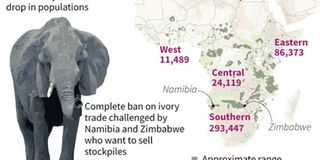Behind bars: Why jailing of ivory kingpins matters

Dar es Salaam. Tuesday’s jailing of the ‘ivory queen’ means two of Tanzania’s foremost ivory kingpins are now behind bars, signaling a major turning point in efforts to combat poaching and protect Tanzania’s endangered elephants.
The global community heartily received the news of the jailing of Chinese woman Yang Feng Glan, 69, whose notoriety in the business earned her the ‘queen of ivory’ tag.
She was at the top of the ladder of dealers who run a sophisticated poaching syndicate responsible for decapitation of thousands of elephants to feed the lucrative underworld market for ivory, especially in China.
Yang Feng Glan who will serve 15 years in jail joins Tanzanian Boniface Matthew Maliango, nicknamed ‘The Devil’, who has been behind bars since March 2017 when he was sentenced to 12 years for ivory trafficking.
Maliango ran an ivory trafficking network across five Africa countries namely: Tanzania, Kenya, Burundi, Mozambique and Zambia.
The two arguably controlled the multi-billion illicit trade in Tanzania and were responsible for corruption networks that facilitated the smuggling of ivory to South Africa, Europe and the US. They ran the business with ruthless abandon and evaded the long arm of the law for decades.
Their jailing was, therefore, seen as a significant blow to the networks blamed for killing more than 50,000 elephants in Tanzania alone over the last ten years. Such was their reputation that US actor Leonardo DiCaprio depicted them in the Netflix movie ‘The Ivory Game.’ China, which took most of the blame for fueling the global demand for ivory has hailed the jailing of Yang Feng Glan who at one time was its quasi-diplomat in Tanzania.
Foreign ministry spokesman Geng Shuang said China supports the Tanzanian authorities in conducting a “just” investigation and trial and is “ready to work with the international community to protect wildlife and curb the international trade.”
Yang Fenglan was convicted of smuggling about 700 elephant tusks and her case was viewed as a major test of Africa-wide efforts to hold key trafficking figures accountable for the mass killings of elephants to supply ivory to illegal markets.
China has cracked down on smuggling in recent years and a total ban on all trade in ivory products came into effect last year. The ban does not cover the semiautonomous port and financial centre of Hong Kong, which remains a major transit point for endangered species products and other contraband but is now working toward a complete ban on the local ivory trade to take effect by 2021.
The minister of Tourism, Dr Hamisi Kigwangalla, believes poaching has now been “curbed.” He wrote on his official twitter page yesterday that elephants were currently much safer in the wilderness. Conservationists say the jail sentences that have so far been served to the ivory kingpins, must be communicated well to serve as a deterrent.
A wildlife expert from the World Wildlife Fund-Tanzania (WWF-Tanzania), Prof Noah Sitati, told The Citizen that there was need for strong advocacy strategies.
“Having a judicial system that can handle cases related to ivory trafficking is another way of ensuring that we curtail this network of traffickers,” he said.
Prof Sitati, however, feels there are gaps that remain to be worked on, noting that equipping of rangers and corruption as ongoing concerns.
Maliango, ‘The Devil’ 47, and the ‘Ivory Queen’ thrived in the underworld due to corruption. Glan came to Tanzania as a Swahili-Chinese translator in the 1970s when China began to build the Tanzania Zambia Railway (Tazara). But she is believed to have begun trafficking in ivory as far back as 2006.
Before the Transnational Serious Crimes Investigation Unit Task Force nabbed Maliango, he is also believed to have worked with Ms Glan on multiple occasions.
The Chinese woman’s story in Tanzania is no ordinary tale. She speaks fluent Kiswahili. She is a graduate of China’s Beijing Foreign Studies University. She also studied Economics and graduated at the Beijing University.
She opened a thriving restaurant business targeting Chinese clientele and which would later be her cover for the illegal trade. She grew vegetables for export too and was known to be close to some powerful people in the establishment over the years.
Ms Yang was charged at the Kisutu court in the year 2015 after she was nabbed in a dramatic car chase in Dar es Salaam. She was charged along with Tanzanians Salvius Matembo and Manase Philemon.
They will both serve a maximum of 15 years in jail. A hefty fine of Sh27.8 billion was slapped on her as well.
Related story:‘Ivory Queen’, accomplices handed 15-year prison terms




